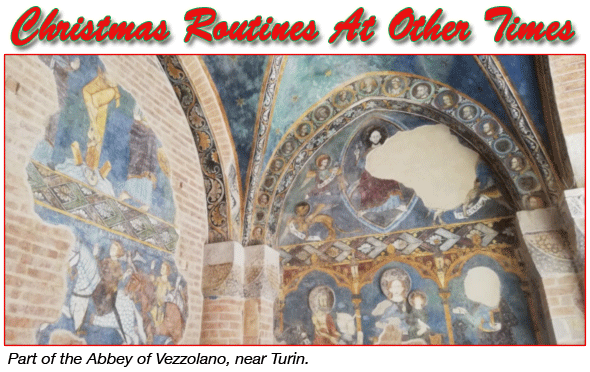 |
In perfect timing with the season,
my friend Geoffrey asked me whether I had a story for Christmas.
As it happens, in Europe we were recently faced with a “suggestion”
that EU citizens should avoid the word Christmas in favour of more
“inclusive” terminology, e.g. the nonspecific Happy
Holidays. Just after hitting the headlines, the EU Commission’s
suggestion was swiftly withdrawn, as most had observed that when
you try to become “inclusive” at all costs, that is
precisely when you start excluding someone else. The Commission
observed the document was not “mature”.
So here we go . . . Sunday morning
in Turin, it is a sunny winter day, gloriously bright despite the
season. Wednesday’s snow still covers the roofs around my
window and the mountains shine with a yellowish white glare, which
the sun streaked on them at daybreak. This is the period of Advent,
a time I only learned to appreciate when I lived in Zurich, with
its special religious fervour. Years ago this was a time of the
year I actually abhorred.
Respectfully leaving the holy Christmas
to those who believe, this is the period of the year when we exchange
presents and are supposed to be good, if at all possible, even more
virtuous than in other months. I guess the concept of Christmas
has become almost universal in the world, if nothing else because
it generates huge GDP with a massive leap in trade and sales. One
way or another we managed to translate the idea of being good into
the idea of being rich and that is not the same thing. Another aspect
of Christmas time is not precisely good: until Christmas Eve everyone
is nervous, has no time for others and the mad rush to meet deadlines
prevails on kindness, in particular in logistics. When I was a young
forwarder in Turin, this was a tough period indeed.
Working in logistics in Turin in the
seventies, you were swimming in smog and pollution, but also in
goods and trade: FIAT, Lancia cars, Olivetti machines, clothing,
buttons, cables, chemicals, whatever. Above anything else, pens
were filling my daily routines: the now defunct Odino Valperga was
my employer, as well as the forwarder of choice for most pen manufacturers
based in Settimo, one of our fast growing industrial suburbs. Export
was so strong in those years that there was never enough land for
factories and never enough equipment for the goods.
In 1973 Settimo was said to produce
about 65% percent of the entire world production of ballpoint and
felt pens. Several companies were active, which are now gone: FAR,
CIPSA, GENOSO, WALKER PEN, the list was long. We were exporting
millions of pens, my share principally to the UK. Apparently our
writing tools were marketed all over the world from London. I had
invented, with our correspondent Anglo Overseas Transport, the fastest
clearance procedure ever: COW as we called it, i.e. clearance on
wheels. It was a novel approach in the UK, which had just joined
the EEC. T-forms were quickly replacing the TIR carnet, so our service
took wings. That was the key of our success and traffic exploded,
making my overtime pay greater than my salary.
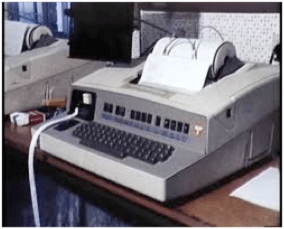 Each
December, when Advent approached I was getting nervous: the fight
for trucks was getting really hard. I needed at least twenty trucks
a week to deliver the groupage loads into the LIFT terminal in eastern
London. We worked 12 hours a day, six days a week and the lines
of trucks to Mont Blanc were legendary. Snow was our biggest enemy,
as climate change was not in sight in those years. The closer Christmas
was approaching, the harder the competition for trucks and the higher
the mountain of pens in the warehouse . . . The files printing stencil
machine was running overtime and our three telexes were working
24/7 to send out “the details”. Getting to the telex
was a physical struggle every Friday afternoon . . . Anyone remembers
this strange object? Each
December, when Advent approached I was getting nervous: the fight
for trucks was getting really hard. I needed at least twenty trucks
a week to deliver the groupage loads into the LIFT terminal in eastern
London. We worked 12 hours a day, six days a week and the lines
of trucks to Mont Blanc were legendary. Snow was our biggest enemy,
as climate change was not in sight in those years. The closer Christmas
was approaching, the harder the competition for trucks and the higher
the mountain of pens in the warehouse . . . The files printing stencil
machine was running overtime and our three telexes were working
24/7 to send out “the details”. Getting to the telex
was a physical struggle every Friday afternoon . . . Anyone remembers
this strange object?
Nearly fifty years later, sitting at my
desk in this brilliant Advent day in my home town, which is now
completely different, I remember the raw passion for the exploding
exports, the shouts from the warehouse and the drivers climbing
to the office upstairs to pick up their papers, a coffee and a smile.
In those years working in logistics was quite mad and undisciplined.
If madness is still there, it goes mostly unnoticed, except in the
rollercoaster ride of the freight prices. Trade has grown tremendously
in the meantime, the goods’ dimensions shrank as the packing
got bigger, our services are more complex and refined and many transactions
no longer require manual procedures, but the mad rush of those endless
Advent Friday nights goes on and on in my memory. I wonder whether
the Hanx Writer App could recognise the unforgettable (and incessant)
clickety-clack of the telex machines. If the App can’t I sure
can, believe me!
After 2006 winter Olympics, Turin has become
a reasonably attractive tourist destination and will host the 2022
Eurovision Song Contest. If you want to look at it from down under,
here
you go. Turin is still mourning its past industrial triumphs though,
as it is trying to deal with the retreat of the car industry that
FIAT imposed on us after over one century of controversial development.
Coffeemakers Lavazza is perhaps the only global corporation in this
area that managed to weather the transition without pain, still
being a principal trader in the world. Very few other businesses
enjoyed a successful transition into this part of history.
Coming back to pens, I was even surprised
to see that CARIOCA
felt pens are still on sale and of course Universal spa, one of
my former clients, is in the historical note of this evergreen brand.
If you open any drawer in my room, pens of all types, colours and
origins materialise: doom or delight? Looking at them I cannot avoid
thinking of the millions I have sent to the UK, in particular at
Christmas. Yesterday’s doom is today’s delight, that’s
life.
There is another link between Christmas
and pens that is worth mentioning. In my third grade my dreams had
come true: my parents and relatives flooded us kids with presents
at Christmas. All had become possible through the increase of wealth
in the country, in particular in Turin, which was on the fast lane
of industrial development in those days.
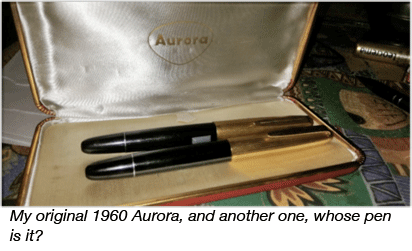 A
novel sense of affluence was coming to the families, including ours.
In 1960 young Sorgetti was very proud of his Aurora fountain pen,
received as a gift for Christmas. A
novel sense of affluence was coming to the families, including ours.
In 1960 young Sorgetti was very proud of his Aurora fountain pen,
received as a gift for Christmas.
Unlike other pens, my Aurora would
not leave stains on my page and it had even a golden cap! I was
on top of the world. The Maharaja of Rewa could not feel more affluent
than I. How would I know then that pens were going to occupy my
later life so abundantly?
When Geoffrey asked me to write this
note in preparation of the festive season I went back to my Christmas
present, the gilded Aurora pen and tried to imagine what remained
today of those childhood emotions. 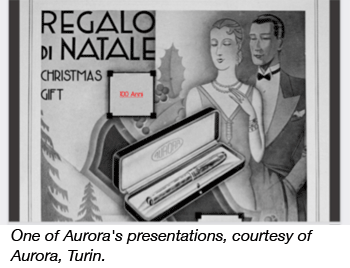 I
knew that Aurora still exists in Turin, so I thought of making contact.
What I did not imagine was that Aurora had become a more complex
business, and is still a thriving enterprise, which successfully
managed to surf the globalization years by doing precisely the opposite
of what others had unsuccessfully tried: they stayed precisely where
they were, banked on their skills and experience, invested heavily
in their core business and strived to be excellent. 24 hours after
sending my message, I received a polite reply from Mr. Cesare Verona,
who runs Aurora today. He is the entrepreneur who managed to steer
his company into modern times, maintain a prestigious brand in Turin,
whilst attracting a cultural, world class, diversified production
around his business. I
knew that Aurora still exists in Turin, so I thought of making contact.
What I did not imagine was that Aurora had become a more complex
business, and is still a thriving enterprise, which successfully
managed to surf the globalization years by doing precisely the opposite
of what others had unsuccessfully tried: they stayed precisely where
they were, banked on their skills and experience, invested heavily
in their core business and strived to be excellent. 24 hours after
sending my message, I received a polite reply from Mr. Cesare Verona,
who runs Aurora today. He is the entrepreneur who managed to steer
his company into modern times, maintain a prestigious brand in Turin,
whilst attracting a cultural, world class, diversified production
around his business.
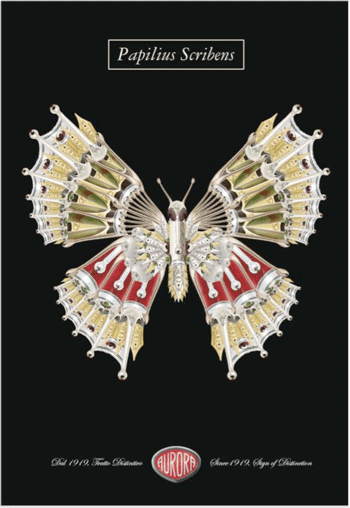 If you have a quarter of an hour to devote to an unusually cultural
presentation of a business, please watch the well-crafted video
that features Mr. Verona presenting his company’s history,
inside the city of Turin, emerging from a centuries-long transition.
If you have a quarter of an hour to devote to an unusually cultural
presentation of a business, please watch the well-crafted video
that features Mr. Verona presenting his company’s history,
inside the city of Turin, emerging from a centuries-long transition.
Please appreciate the stamina running through
this great family of entrepreneurs working in a converted abbey,
trying to resurrect it to its former architectural glory after decades
of mistreatment. The patient let the good one work and wait for
the result. In a period when conformism seems to be a duty, this
is an exquisite example that success can come from unsuspected parts.
So we come to the end of this small story:
I am asking myself what does it mean to be good? What does it mean
to behave yet more virtuously because it is Christmas? My take is
that Mr. Verona and the ladies and men working with him just represent
one of the ways.
There are many other ways to be good, perhaps
even more essential. Nurses and doctors who help those in medical
care must be good 24/7, no respite for them who, together with the
caregivers who help the weaker ones of our society, embraced a mission
rather than a job … We have learnt how important that is during
the pandemic, haven’t we? We should fully appreciate their
dedication. 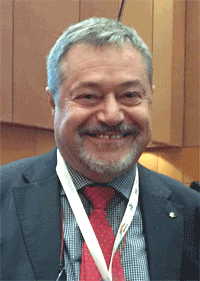 Good
are also the drivers who make sure our presents are delivered on
time, the staff in the warehouses who sort the parcels, and those
who adorn wonderful shop windows with those gifts for the delight
of their customers. It is impossible to list all the good ones,
they are so many! These people represent the spirit of Christmas
and stretch it to cover the entire year, on and on, without surrendering
to difficulties. In my opinion being good means striving for excellent
results in your work, whatever your call is, with no distinction
of gender, colour, religion, creed, and even political belief. Good
are also the drivers who make sure our presents are delivered on
time, the staff in the warehouses who sort the parcels, and those
who adorn wonderful shop windows with those gifts for the delight
of their customers. It is impossible to list all the good ones,
they are so many! These people represent the spirit of Christmas
and stretch it to cover the entire year, on and on, without surrendering
to difficulties. In my opinion being good means striving for excellent
results in your work, whatever your call is, with no distinction
of gender, colour, religion, creed, and even political belief.
The rest is our love in the family and
Christmas is the time when our families unite to feel love and affection.
So, my friends, if you know that somebody near you is at risk of
being alone at Christmas, please open your family up to welcome
“thy neighbour”, and treat him or her as you would like
to be treated in return.
Happy holidays! How does that sound?
My best wishes to all of you for the New Year, too.
Marco Sorgetti
 |




